#tourism investment projects
Explore tagged Tumblr posts
Text
Between January 2023 and May 2023, a total of 55 foreign direct investments tourism projects were recorded globally.

This World Tourism Day 2023, let's pave the way for a more sustainable future!
That’s why we dedicated the day to green investments.
Shape a better by making room for eco-friendly infrastructure, renewable energy and community-driven initiatives
World Tourism Day 2023 | “Tourism and Green Investment”
#unwto#tourism sector#travel & tourism#world tourism day#Foreign Direct Investment (FDI)#tourism investment projects#green investments#27 september#eco-friendly infrastructure#green initiatives#green energy#green infrastructure
0 notes
Text
Government Policies for a Green Economy: Incentives and Regulations

Green Economy A successful transition to a green economy requires a combination of public and private sector efforts, Green Economy with governments playing a crucial role in setting the framework for this transformation. Policies often target sectors such as energy, transportation, agriculture, waste management, and construction, which are significant contributors to environmental impacts. In this context, incentives and regulations serve as two sides of the policy coin, ensuring both the encouragement of sustainable practices and the enforcement of environmental protection.
One of the main goals of government policies for a green economy is to shift economic activity toward more sustainable practices. This involves reducing greenhouse gas emissions, promoting renewable energy, and ensuring that economic growth is decoupled from environmental degradation. To achieve these goals, governments employ a wide range of tools, including tax breaks, subsidies, grants, carbon pricing mechanisms, and strict environmental regulations.
A green economy also emphasizes social inclusiveness, Green Economy ensuring that the transition to sustainability benefits all members of society, particularly vulnerable groups who are most affected by environmental degradation. Green Economy Government policies often include provisions for job creation in green industries, education and training for new skills, and social protection measures to ensure that no one is left behind in the transition.
This section will delve into six key areas of government policies for a green economy: renewable energy incentives, carbon pricing mechanisms, green transportation policies, sustainable agriculture support, waste management and recycling regulations, and financial incentives for green innovation.
Renewable Energy Incentives Green Economy
One of the cornerstones of any green economy policy framework is the promotion of renewable energy sources. Governments have introduced a range of incentives to encourage the production and consumption of renewable energy, such as wind, solar, and hydropower. These incentives are critical for reducing reliance on fossil fuels, which are the primary source of greenhouse gas emissions.
Renewable energy incentives often take the form of subsidies and tax breaks. For instance, many governments offer production tax credits (PTCs) and investment tax credits (ITCs) to companies that generate renewable energy or invest in renewable energy infrastructure. These financial incentives lower the cost of renewable energy projects, making them more competitive with traditional fossil fuel-based energy sources.
Feed-in tariffs (FITs) are another common incentive mechanism. Green Economy Under a FIT program, renewable energy producers are guaranteed a fixed price for the electricity they generate, often over a long-term contract. This provides a stable revenue stream and reduces the financial risk associated with renewable energy investments. Net metering programs, which allow individuals and businesses to sell excess renewable energy back to the grid, are another way governments encourage the adoption of renewable technologies.
Governments also support renewable energy through research and development (R&D) funding. Green Economy By investing in the development of new technologies, governments can help bring down the cost of renewable energy and make it more accessible. Many governments also provide grants and low-interest loans for renewable energy projects, particularly for smaller-scale projects such as rooftop solar installations.
In addition to financial incentives, governments often mandate the use of renewable energy through renewable portfolio standards (RPS). An RPS requires utilities to obtain a certain percentage of their electricity from renewable sources, creating a guaranteed market for renewable energy. This not only supports the growth of the renewable energy industry but also helps reduce the overall carbon footprint of the energy sector.
Green Economy The combination of financial incentives and regulatory mandates has been instrumental in driving the rapid growth of renewable energy in many parts of the world. Countries such as Germany, Denmark, and China have become global leaders in renewable energy production, thanks in large part to strong government policies that promote green energy development.
Carbon Pricing Mechanisms
Carbon pricing is a critical tool in the fight against climate change and a key component of government policies for a green economy. By putting a price on carbon emissions, governments create an economic incentive for businesses and individuals to reduce their carbon footprint. There are two main types of carbon pricing mechanisms: carbon taxes and cap-and-trade systems.
A carbon tax directly sets a price on carbon by levying a tax on the carbon content of fossil fuels. This encourages businesses and consumers to reduce their use of carbon-intensive energy sources and shift toward cleaner alternatives. The revenue generated from carbon taxes is often used to fund green initiatives, such as renewable energy projects or energy efficiency programs, or to provide rebates to low-income households to offset higher energy costs.
Cap-and-trade systems, also known as emissions trading schemes (ETS), work by setting a limit (or cap) on the total amount of greenhouse gas emissions that can be emitted by covered entities, such as power plants or industrial facilities. Companies are issued emission allowances, which they can trade with one another. Companies that can reduce their emissions at a lower cost can sell their excess allowances to companies that face higher costs for reducing emissions. This creates a market for carbon allowances and incentivizes businesses to invest in cleaner technologies.
Both carbon taxes and cap-and-trade systems are designed to internalize the environmental cost of carbon emissions, making it more expensive to pollute and more profitable to invest in sustainable practices. These mechanisms can drive innovation, as businesses seek out new technologies and processes to reduce their carbon liabilities.
Several countries and regions have implemented carbon pricing policies with varying degrees of success. The European Union’s Emissions Trading System (EU ETS) is one of the largest and most established cap-and-trade programs in the world. Canada has implemented a nationwide carbon tax, with revenue returned to households through rebates. In the United States, some states, such as California, have implemented their own cap-and-trade programs in the absence of a national carbon pricing policy.
However, carbon pricing mechanisms face challenges, including political opposition and concerns about economic competitiveness. In some cases, businesses argue that carbon pricing increases costs and puts them at a disadvantage compared to competitors in countries without similar policies. To address these concerns, governments often include provisions to protect industries that are vulnerable to international competition, such as offering rebates or exemptions for certain sectors.
Green Transportation Policies
Transportation is a major source of greenhouse gas emissions, particularly in urban areas. To promote a green economy, governments are implementing a range of policies aimed at reducing emissions from the transportation sector. These policies focus on promoting the use of public transportation, encouraging the adoption of electric vehicles (EVs), and improving fuel efficiency standards.
One of the most effective ways to reduce transportation emissions is to encourage the use of public transportation. Governments invest in expanding and improving public transit systems, such as buses, trains, and subways, to make them more accessible and attractive to commuters. By providing reliable and affordable public transportation options, governments can reduce the number of cars on the road and lower overall emissions.
In addition to improving public transportation, governments are offering incentives for the purchase of electric vehicles (EVs). These incentives often take the form of tax credits or rebates for EV buyers, which help offset the higher upfront cost of electric vehicles compared to traditional gasoline-powered cars. Some governments also offer additional perks for EV owners, such as access to carpool lanes or free parking in city centers.
Governments are also investing in the infrastructure needed to support electric vehicles, such as building charging stations. A lack of charging infrastructure is often cited as a barrier to EV adoption, so governments play a critical role in addressing this challenge. By providing grants or partnering with private companies, governments can help build a network of charging stations that makes EVs a more convenient option for drivers.
Another important component of green transportation policies is improving fuel efficiency standards for cars and trucks. Governments set regulations that require automakers to produce vehicles that meet certain fuel efficiency targets, which helps reduce the amount of fuel consumed and the emissions produced by the transportation sector. Some governments also implement vehicle emissions standards, which limit the amount of pollutants that cars and trucks can emit.
In addition to these policies, governments are encouraging the use of alternative modes of transportation, such as biking and walking. Investments in bike lanes, pedestrian infrastructure, and bike-sharing programs make it easier for people to choose low-emission forms of transportation. These efforts not only reduce emissions but also improve public health by promoting physical activity.
Sustainable Agriculture Support
Agriculture is both a contributor to and a victim of environmental degradation. It is responsible for significant greenhouse gas emissions, deforestation, water use, and pollution from fertilizers and pesticides. At the same time, agriculture is highly vulnerable to the impacts of climate change, including more frequent droughts, floods, and changing weather patterns. As a result, governments are increasingly focusing on promoting sustainable agricultural practices as part of their green economy policies.
One of the key ways governments support sustainable agriculture is through financial incentives for farmers who adopt environmentally friendly practices. These incentives can take the form of subsidies, grants, or low-interest loans for practices such as organic farming, agroforestry, and conservation tillage. By providing financial support, governments encourage farmers to invest in sustainable practices that might otherwise be cost-prohibitive.
Governments also provide technical assistance and education to help farmers transition to more sustainable practices. This can include training programs on topics such as water conservation, soil health, and pest management, as well as access to research and technology that supports sustainable farming. Extension services, which provide hands-on assistance to farmers, are another important tool for promoting sustainable agriculture.
In addition to financial and technical support, governments implement regulations to reduce the environmental impact of agriculture. These regulations can include restrictions on the use of certain pesticides and fertilizers, requirements for buffer zones to protect water sources from agricultural runoff, and mandates for the reduction of greenhouse gas emissions from livestock and manure management.
Governments are also working to promote more sustainable food systems by encouraging the consumption of locally produced and organic foods. Public procurement policies, which require government institutions such as schools and hospitals to purchase a certain percentage of their food from sustainable sources, are one way governments support the development of local, sustainable food systems.
Another important aspect of sustainable agriculture policies is protecting biodiversity and promoting ecosystem services. Governments often provide incentives for farmers to preserve natural habitats on their land, such as wetlands, forests, and grasslands, which provide important ecosystem services such as carbon sequestration, water filtration, and pollination. By promoting biodiversity and ecosystem health, governments help ensure that agricultural systems are more resilient to environmental changes.
Waste Management and Recycling Regulations
Effective waste management is a critical component of a green economy. Governments play a key role in regulating waste disposal, promoting recycling, and encouraging the reduction of waste generation. These efforts are aimed at reducing the environmental impact of waste, including greenhouse gas emissions from landfills, pollution from improper disposal, and the depletion of natural resources through excessive consumption.
One of the main ways governments regulate waste is by setting standards for waste disposal. This includes regulating landfills, incinerators, and hazardous waste facilities to ensure that they operate in an environmentally responsible manner. Governments also implement bans or restrictions on certain types of waste, such as single-use plastics, to reduce the amount of waste that ends up in landfills or the environment.
In addition to regulating waste disposal, governments are increasingly focusing on promoting recycling and waste reduction. Many governments have implemented extended producer responsibility (EPR) programs, which require manufacturers to take responsibility for the disposal of the products they produce. This can include requirements for companies to fund recycling programs or take back products at the end of their life cycle.
Governments also implement policies to encourage households and businesses to recycle more. This can include providing curbside recycling services, setting recycling targets, and offering incentives for recycling, such as deposit return schemes for beverage containers. Public awareness campaigns and education programs are also important tools for promoting recycling and waste reduction.
In some cases, governments use economic instruments to promote waste reduction, such as charging fees for waste disposal or providing financial incentives for businesses that reduce waste. Pay-as-you-throw programs, which charge households based on the amount of waste they generate, are one example of how governments use pricing mechanisms to encourage waste reduction.
Another important component of waste management policies is promoting the circular economy, which focuses on keeping materials in use for as long as possible through recycling, reusing, and remanufacturing. Governments support the circular economy by providing incentives for businesses that adopt circular practices, such as designing products for durability and recyclability, and by setting targets for reducing waste and increasing recycling rates.
Source :
Government Policies for a Green Economy: Incentives and Regulations
#Carbon Pricing Mechanisms#Circular Economy Policies#Clean Energy Subsidies#Climate Change Mitigation Strategies#Climate Resilience Planning#Community Sustainability Programs#Eco-Friendly Transportation Initiatives#Eco-Tourism Development Strategies#Energy Efficiency Standards#Environmental Policy Frameworks#Environmental Protection Regulations#Government Grants For Green Projects#Government Policies For A Green Economy#Green Building Regulations#Green Job Creation Initiatives#Green Tax Incentives#Incentives For Energy Audits#Incentives For Sustainable Development#Investment In Green Technologies#Low-Emission Vehicle Incentives#Pollution Control Policies#Public Transport Expansion Regulations#Regulations Promoting Renewable Energy#Renewable Energy Certificates#Smart City Regulations#Sustainable Agriculture Policies#Sustainable Forestry Practices#Sustainable Urban Development Policies#Waste Management Policies#Water Conservation Regulations
1 note
·
View note
Text
Kolhan's Tourism Potential Highlighted by SCCI to State Officials
Chamber meets with Tourism Dept., presents proposals for regional development The Singhbhum Chamber of Commerce and Industry (SCCI) delegation discussed Kolhan’s tourism potential with state officials. JAMSHEDPUR – SCCI representatives met with Tourism Department officials to propose enhancements for Kolhan’s tourism sector. During the meeting in Ranchi, the SCCI delegation, spearheaded by…
#बिजनेस#business#Chandil Dam project#Dalma-Dimna Ropeway plan#Jharkhand tourist attractions#Kolhan tourism development#Manoj Kumar Tourism Secretary#SCCI tourism proposals#Singhbhum Chamber of Commerce#Swadesh Yojna investment#Tourism Conclave Jamshedpur#Vijay Anand Moonka SCCI
0 notes
Text
My ideal economy is highly authoritarian which sucks because who the hell is ever going to get on board with that
#my posts#people hate being told what to do especially by strangers but the problem is if we let people do whatever we want then people act evil#but i want a government to calculate exactly how many jobs are needed in Every sector in order for everybody's needs to be provided equally#and then to create quotas and incentived and early track education programs to ensure that these jobs are filled#and in theory because theres so many people and people are so productive that if we just had a neat enough system#then disabled people and children wouldnt Have to work to get their needs met#but they would have a very easy to navigate system for finding remote & temp jobs when they wanted to work#because in my ideal society everyone has their needs met so everyone only works to generate fun spending money#for like tourism and arts and research projects and eccentric coin collections or whatever#i think if someone told you that you would never have to pay for rent or veggies again but u had to work to pay for movie tickets#you'd still want to work a little right? youd want to work a job that Matters so you could clock out and go bowling#basically my ideal society is one where productivity is motivated out of desire for fun rather than a need to survive#and sure not every job is FUN but some people are good at farming and some people are good at accounting and some people are good at making#coffee and all of these things are useful so if you didnt have to worry about working to survive wouldnt you Eventually get bored#and want to fill your time up with Something that contributes to society?#maybe no you wouldnt. but what if you grew up in a community that taught you that 'work' is all about giving back to your community?#that to 'work' is to invest in a society that provides all your basic needs and never leaves you hungry or homeless or without healthcare#and the reward for working is not only that you get to come home to a house that you will never* be evicted from#but All the money you make gets to go towards Whatever you want. it doesnt Have to go towards maintaining the life you already have#all that you earn can be put towards upgrading and expanding your life. instead of rent or mortgage bills#your money can save for a ~fancier~ house or a bidet. or something idk. can you see it?#the biggest problem is wtf is a bureaucracy that is 'easy to navigate' ROFL have you fucking Ever heard of that??#how tf do i invent a government system that understands how all sectors of society work together and can easily & clearly#explain that dynamic and track All of the necessary jobs + resources + people that go into a society#like imagine if a government was there to help make your life better And it actually did that?? doesnt exist. how do i invent something#that does not fucking exist?? im not an inventor im a prenursing student ;-;
1 note
·
View note
Text

Navigation: ੈ♡˳Masterlist ੈ♡˳Template
ੈ♡˳Askbox ੈ♡˳Arts credit

2th house through the signs
ARIES. Your independence and freedom are extremely important to you, and this is reflected in the way you handle money and personal resources. While you may make impulsive purchases, you also have a strong drive to reach financial security and are quite aggressive in your pursuit of it. It's important to note, however, that managing stress and impulse buying is key to maintaining a healthy budget. When you're invested in a project, you have a strong work ethic and are willing to put in the effort to get the job done quickly and efficiently. You might find that you thrive in fields related to construction, mechanical design, or architecture, as these industries can help you build a strong financial foundation. Professions such as police work, military service, firefighting, and manufacturing can be especially lucrative for you, as you have a strong desire to make money and are confident in your ability to do so. It's clear that your financial situation is tied to your self-esteem, and achieving financial success can make you feel even better about yourself. Overall, it's important to strike a balance between your desire for financial security and your impulsive tendencies. With the right mindset and a bit of careful planning, you can achieve your goals while maintaining a healthy relationship with money.
TAURUS. You have a down-to-earth and practical approach when it comes to managing your finances, and you place a high value on security and convenience. You have a great talent for handling money and are known for being dependable and sensual. You take a realistic approach when making investment and savings decisions, and while you may sometimes be stubborn when it comes to financial advice, it has helped you save money in the past. Although trusting your intuition has worked in your favor before, expanding your knowledge of financial institutions like banks and brokerages could benefit you even further. You have a keen interest in the arts and entertainment industries, which offer great potential for financial success. Your desire for wealth is driven by a passion for acquiring luxurious and valuable items, and you may have expensive tastes. While you occasionally indulge in impulse purchases, you generally have a practical approach to money and excel in business. With your skills, quick monetary gains are definitely within reach.
GEMINI. You have a lot of great ideas for generating income. However, it's important to keep in mind that you tend to let money slip away, so it's a good idea to be mindful of that. Your intelligence and quick thinking skills are definitely assets, but try not to jump too quickly from one venture to the next, as it may cause some turbulence in your financial affairs. It might be helpful to consolidate your interests a bit, rather than spreading yourself too thin. If you're looking to diversify your approach to earning a living, switching careers or exploring new investments could be great options for you. You have a knack for developing creative ways to improve your financial foundation, so don't be afraid to try new things. There are plenty of opportunities out there, particularly in fields like teaching, writing, transportation, and tourism. One thing to keep in mind is to avoid mixing finances with family or neighbors. You approach your finances from a logical perspective, which can be helpful, but it's important not to get too caught up in fretting about your finances or developing overly complicated budgets and plans. The good news is that you have the ability to adapt to any financial situation, so you'll be able to navigate whatever comes your way.
CANCER. You value financial security and stability, which is totally understandable. You like to have a safety net and make sure you can take care of yourself and your loved ones. Family may play a role in how you manage your money, but you're creative and resourceful when it comes to finding ways to keep your hard-earned cash safe. You're a caring and generous person, and you may be inclined to give to others or support causes you believe in. When you do spend money, you tend to focus on things that bring you joy, comfort, or improve your overall well-being. Investing in areas like agriculture, property, and commodities can be a smart move for you, and you take a thoughtful and careful approach to managing your money. You love spoiling your family and friends, but you also recognize the importance of being financially responsible and keeping your funds in order. When your finances are in good shape, you feel more relaxed and able to enjoy the things that matter most in life.
LEO. You have worked hard to achieve financial stability and you take pride in your earnings and assets. Your creativity and business acumen have played a significant role in your success, and you are always looking for new ways to reach your goals. You are fortunate to have the support of high-ranking individuals who want to see you succeed, and you value their encouragement. You are drawn to business or career opportunities that allow you to showcase your skills and put you in the public eye. Your organizational talents have helped you to effectively manage people and situations related to finances, leading to recognition within your community or the entertainment industry. While you have a natural inclination towards investing and taking risks, it's important to be cautious and mindful of the potential risks involved. You understand that financial success is important, but you also know that it's not the only thing that brings happiness and fulfillment in life. At times, you may enjoy indulging in luxury and extravagance, but ultimately you understand that material possessions are not the most important things in life. You value the simple pleasures and find joy in the things that truly matter, like spending time with loved ones and pursuing your passions.
VIRGO. You have a habit of keeping your money and valuables safe, and takes pride in accumulating material goods in an organized and methodical manner. People around you truly admire your attention to detail, and it's fantastic that you handle your finances with caution and wisdom. You're always aware of your financial situation, which helps you stay within your budget and avoid impulsive purchases that could result in financial trouble. Your sharp focus and attention to detail are excellent assets when it comes to keeping your investments on track, but it's important to keep in mind that being overly critical of others, especially those close to you, can be harmful. Nonetheless, you have a clear vision of what you want to do with your money and keep thorough records to achieve your goals. It's impressive that you're sensible with your finances, always planning ahead, but it's crucial to avoid impulsive decisions that could cause issues. When your finances aren't in order, it can cause physical and emotional stress, which can be avoided by staying organized and in control of your money. Remember to take care of your financial health to prevent anxiety and possible physical illnesses.
LIBRA. When it comes to your financial situation, things are likely to work in your favor, giving you the opportunity to achieve some level of success in reaching your goals. However, there's a good chance that you weren't satisfied with a job where you made most of your money in ways that didn't suit you or in areas where you lacked skill. You'd find more fulfillment in earning money through creative pursuits like writing, painting, sculpture, architecture, interior design, or even through investments that provide a steady income. If you enter into business partnerships or agreements with others for mutual gain, there's a chance for success. But hey, be careful with your choices, as you could end up losing money. A partnership in business or a supportive marriage can be a great asset. You strive to maintain a balanced budget by carefully considering the pros and cons of your expenses and investments. If you feel your financial life is out of whack, it's okay to start from scratch. Making money with the help of a partner or through marriage is a possibility. You have expensive taste, but you're not one to spend beyond your means, and you try to avoid wasting money on unnecessary purchases. You could find opportunities to make money in the arts, law, beauty industry, fashion, or even the wedding industry, for example.
SCORPIO. Money and material possessions really get your emotions going. Sometimes you might feel a twinge of envy when you see others succeeding financially. You value your enthusiasm and have a positive outlook when it comes to your financial situation. You're willing to put in the hard work to reach your goals. Your determination usually helps you overcome any obstacles, whether they're natural or man-made. In the end, you should be able to achieve financial independence and create a comfortable home for yourself. While you're not one to be frivolous, you do have a strong desire to spend money to grow your financial base or expand your influence. Just be careful not to react too slowly when it comes to financial matters, as that could lead to temporary losses or setbacks. When it comes to investments that involve growth and expansion or utilities with future potential, you can usually rely on your keen judgment. You prefer to keep your financial life private because you don't want others to know about your wealth or lack thereof. You have the potential to make a good amount of money in your life, but it may not be your ultimate ambition. You might consider long-term investments or even partnering up with someone in a business venture to make money.
SAGITTARIUS. When it comes to money, you have a sense of abundance. You might even be a bit of a scrooge at times. You're great at seeing the big picture, which often gives you a feeling of luck or fortune when it comes to handling your finances. However, this mindset also makes you more prone to taking risks in the hopes of boosting your bank account. Unfortunately, it can lead to financial losses if you're not careful with your planning. You may have a tendency to gamble or turn money into a game, finding excitement in the ups and downs of your fortunes. You naturally gravitate towards industries involved in international affairs, foreign investment, travel, publishing, and higher education. Just make sure to research the merits of any cause before you start throwing money around or making generous contributions in public. When it comes to money, you have a generous attitude and don't mind giving it away. As long as you have enough to cover your needs and help others, you're content. You're not afraid to take risks to make more money, and if things don't work out, you're ready to shrug it off and try again.
CAPRICORN. When it comes to making money, you're all about being organized and methodical. You take pride in your self-control and wisdom when it comes to your finances. You're not one to spend money without thinking it through and doing thorough research. Keeping to a savings plan is your jam, which shows that you value stability and setting yourself up for a better future. And hey, investing in things like real estate, property, or precious metals might bring in some extra cash. Your knack for organization and sense of responsibility make you a pro at handling business and financial matters. You're all about exploring opportunities for profit and bringing people together to make it happen. Who knows, this could even catch the attention of the public or politicians, leading to some community or national service. But don't get me wrong, you're no spendthrift. You're cautious and calculated with your money, always thinking twice before making financial decisions. Some might see you as frugal, thinking you have less than you actually do. But that's because you're smart about getting the most out of your money and gradually building up your savings for a more comfortable future. With your skills, you could make some serious dough in fields like politics, entrepreneurship, or working as a career planner or counselor. Just be careful with your spending and keep that financial sense in check.
AQUARIUS. When it comes to money and things, you're in for a wild ride. You value your uniqueness and creativity above all else. Get ready for some unpredictable twists and turns in your financial matters because your income sources can be anything but ordinary. Don't worry though, this doesn't mean you won't succeed. In fact, many of your dreams and aspirations are rooted in this unpredictability. You've got the potential to make connections with people who can directly impact your financial ambitions, and you might even stumble upon opportunities through your acquaintances who know all the right folks. If you're looking to make investments, areas like electronics, aircraft, inventions, scientific research and development, and the computer sector can be pretty lucrative. But here's a piece of advice: avoid relying on other people's money. It can lead to a whole bunch of issues and misunderstandings. You're the kind of person who keeps emotions separate from finances, and you don't stress too much about money on an emotional level. It may come and go in bursts, and you might find yourself in jobs where income isn't consistent, like commission-based or sales roles. Fluctuating earnings are pretty common, and you might depend on these avenues for the bulk of your income.
PISCES. So, money matters can be a bit confusing for you. It's not always easy to meet your financial obligations, and you might find yourself scratching your head about it. But hey, you really value compassion, and that's awesome. When it comes to finances, keep an eye out for unexpected opportunities that might come your way. But be careful, 'cause there can be risks involved. Make sure you know what you're getting into before jumping in blindly. There might be hidden conditions or consequences that you need to consider. Don't worry, though. If you take the time to investigate and gather all the info, it won't feel like such a mysterious puzzle. You've got this natural psychic sense that helps you see through dishonesty and deception, which is pretty cool. But hey, don't take your financial life too lightly. It's important to be responsible with your money. Sometimes you might come up with these grand money-making schemes that never really pan out, or you struggle to keep track of your funds. Just try to be a bit more organized and thoughtful when it comes to your finances.
(CC) AstroJulia Some Rights Reserved
#astrojulia#astrology#witchblr#all about astrology#astroblr#astro community#astro observations#astrology notes#witch community#astro placements#aries 2nd house#taurus 2nd house#gemini 2nd house#cancer 2nd house#leo 2nd house#virgo 2nd house#libra 2nd house#scorpio 2nd house#sagittarius 2nd house#capricorn 2nd house#aquarius 2nd house#pisces 2nd house#natal chart#2nd house
283 notes
·
View notes
Text




On 20th September, 1967, the QE2 launched from John Brown’s yard in Clydebank.
By the end of the 1950s, discussion over the replacement of the Queen Mary and Queen Elizabeth was taking place. The decision to replace the ‘Queens’ was deemed to be of national importance and as such a special committee, known as the Chandos Committee was created to advise the Government and to determine whether such a project was economically viable. Originally Cunard had wanted to build two new liners with the help of a Government subsidy, however the committee’s report proposed that the Government loan Cunard £18 million towards the construction of one vessel. The project became known as ‘Q3’ and six British shipyards were asked to tender – this prestigious project was a huge opportunity for home based shipbuilders to construct a transatlantic liner.
The new ship, code-named was built by John Brown & Company Ltd, Clydebank (later Upper Clyde Shipbuilders Ltd) and scheduled for May 1968. On 20th September 1967 the keel was launched by Queen Elizabeth II and the ship was named Queen Elizabeth 2. She was the last Atlantic Ocean Liner of it’s kind to be built in the UK.
QE2’s maiden transatlantic crossing set sail on 2 May 1969. She was well received by the American public, and became a profitable ship in her early years of service. During her first season, Cunard were able to repay £2.5 million of the Government loan. Her dual purpose design had allowed QE2 to thrive where her transatlantic counterparts could not.
In January 1971 while cruising in the Caribbean, QE2 received a distress call from the French liner Antilles. Antilles had run aground off the coast of Mustique in the Grenadines and caught fire. Being a fast ship in close proximity to the Antilles, QE2 went to her assistance.
However, by the time the QE2 arrived the passengers had been taken ashore. Antilles passengers and crew were brought aboard QE2 and taken to Barbados. As a testament to the quality of service offered aboard QE2, some of the Antille’s passengers booked subsequent cruises on the Cunarder.
In May 1972, while at sea during a transatlantic crossing, Captain William Law received notification that there was a bomb aboard QE2. Cunard took this threat very seriously and alerted the British Government who sent a bomb disposal unit out to the ship. Bomb disposal experts parachuted into the sea close to the ship and were brought aboard by QE2’s tenders. After a full sweep of the ship, the all clear was given as it turned out to be a hoax.
Later the FBI arrested the culprit for making similar threats against Pan American Airways. The bomb disposal teams were awarded the Queen’s Commendation for Brave Conduct.
As QE2’s cruising popularity increased and in response to the ongoing decline in shipping traffic on the North Atlantic, Cunard reduced the number of transatlantic crossings that QE2 took. The company maintained a strong summer presence on the Atlantic, however shifted the focus for the ship towards cruising. This saw QE2 undertake her first world cruise, an event that was well received – QE2 undertook a further 25 world cruises during her career.
Queen Elizabeth 2 was retired from active Cunard service in November 2008. She had been acquired by the private equity arm of Dubai World, which planned to begin conversion of the vessel to a 500-room floating hotel moored at the Palm Jumeirah, Dubai.
Following a multi-million-dollar investment programme, the 13-deck ship has been restored to her former glory and today serves as a world-class entertainment, tourism, hotel and dining destination in Dubai.
14 notes
·
View notes
Text
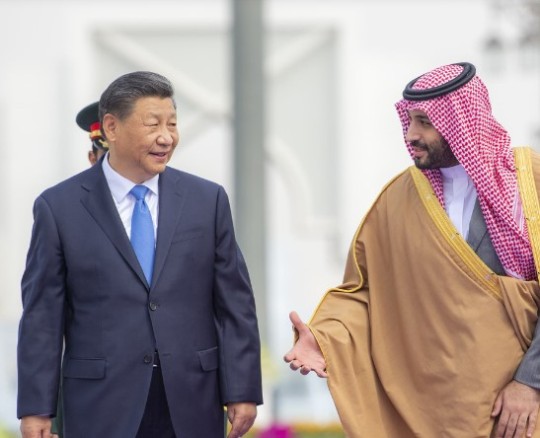
In 2024, 750 Chinese companies are working in Saudi Arabia. I will write about some aspects of the business collaboration between China and KSA
China and Saudi Arabia have deepened their collaboration across multiple sectors, driven by Saudi’s Vision 2030 and China’s Belt and Road Initiative (BRI).
Key Areas of Collaboration:
- Energy: China is a major importer of Saudi oil, and joint ventures like YASREF strengthen their energy ties.
- Infrastructure: Chinese companies, such as CSCEC, are involved in major projects like Neom and railway development.
- Technology: Huawei plays a key role in deploying 5G and advancing AI in Saudi Arabia.
- Manufacturing: Collaboration in industrial zones supports Saudi’s diversification efforts.
- Renewable Energy: Chinese firms are engaged in solar and wind projects.
- Cultural & Tourism: Growing cultural exchanges, tourism, and language programs strengthen ties.
- Defense: Cooperation in arms and military technology is growing, though less publicized.
- Finance: Chinese banks operate in Saudi Arabia, with mutual investments bolstering financial ties.
This partnership supports both nations' economic goals and strengthens their strategic positions.
#KhalidAlbeshri #خالدالبشري
#advertising#artificial intelligence#autos#business#developers & startups#edtech#education#finance#futurism#marketing
11 notes
·
View notes
Text

💥 … good news!!! — July 20, 2024!!
By: LaillaB, founder of ‘Reclaim the Narrative’, from LinkedIn …
“As Israel's genocidal war against Gaza continues unabated, the Israeli economy is facing a catastrophe.
The economic indicators speak of nothing less than an economic catastrophe.
Over 46,000 businesses have gone bankrupt, tourism has stopped, Israel's credit rating was lowered, Israeli bonds are sold at the prices of almost "junk bonds" levels, and the foreign investments that have already dropped by 60% in the first quarter of 2023 (as a result of the policies of Israel's far-right government before October 7) show no prospects of recovery.
The majority of the money invested in Israeli investment funds was diverted to investments abroad because Israelis do not want their own pension funds and insurance funds or their own savings to be tied to the fate of the State of Israel.
This has caused a surprising stability in the Israeli stock market because funds invested in foreign stocks and bonds generated profit in foreign currency, which was multiplied by the rise in the exchange rate between foreign currencies and the Israeli Shekel.
But then Intel scuttled a $25 billion investment plan in Israel, the biggest BDS victory ever.
Three Israeli historians, two Zionists and one anti-Zionist, have declared that the Zionist project has come to an end.
Israel's power grid, which has largely switched to natural gas, still depends on coal to supply demand.
The biggest supplier of coal to Israel is Colombia, which announced that it would suspend coal shipments to Israel as long as the genocide was ongoing.
After Colombia, the next two biggest suppliers are South Africa and Russia.
Without reliable and continuous electricity, Israel will no longer be able to pretend to be a developed economy.
The physical destruction in Israel has been minimal, but one thing has been destroyed: its future.
When a critical mass of Israelis, regardless of their political opinions, become convinced that Israeli apartheid has become unsustainable, they will no longer agree to invest energy and money and risk their lives and their families for the sake of the Zionist project.
They will seek out a better future for themselves, as every sane person would, either by leaving Israel, or better yet, by working towards a new and democratic political system in Palestine 🇵🇸 إن شاء الله
Mondoweiss.
🃏 An economy built on the exploitation and suffering of others is a house of cards destined to collapse.
إن شاء الله
#reclaimthenarrative — 🍉🕊 — #FreePalestine … @hrexach
#dr rex equality news information education#graphic source#graphic#graphics#hortyrex ©#horty#quote#it is what it is#linkedin#israel#israhell#israel terrorist#economy#crashing#war#war crimes#war criminals#good news
11 notes
·
View notes
Text
Shell 4.1 Live Reactions
(This is me, writing reactions as I read, because why the fuck not. They're not complete, mature thoughts taken after I sit back and evaluate what I've read. Consider them as such)
“Funny thing is,” I replied, turning my attention back to my notebook, “You’re the only person today who seemed to notice I was gone. If you aren’t careful, I might actually think you cared.” I wasn’t being entirely honest there. My art teacher had noted my absence, but that was only after I’d reminded her I hadn’t turned in my midterm project.
The degree to which Taylor lives rent free in Emma's head is remarkable.
“Every time I see you, it’s this irritating little reminder of time I wasted being your friend. You know those embarrassing events in your past that make you cringe when you think back on them? For me, that’s basically every sleepover, every juvenile conversation, every immature game you dragged me into.”
Really sounds like a you problem, Emma. Like, they do make therapists for that.
“Really, Taylor? Tell me, what are you doing with yourself? You’re not going to school, you have no friends, I doubt you’re working. Are you really in a position to call me immature, when I’ve got all that going for me and you just… don’t?”
And you have all that going for you and still feel compelled to focus on Taylor? Who's the pathetic one here?
coming behind a one and a half page story on an Amber Alert
Dinah Alcott?
The market was open all week, but most people just rented the stalls on the weekends. It was fairly cheap, since you could get a stall for fifty to a hundred dollars on a weekday and two hundred and fifty to three hundred on weekends, depending on how busy things were. The stalls showcased everything from knick-knacks handicrafts put together by crazy cat ladies to overstock from the most expensive shops on the Boardwalk, marked down to ten or twenty five percent of the usual price. There were ice cream vendors and people selling puppies, there was tourism kitsch and there was a mess of merchandise relating to the local capes. There were racks of clothing, books, computer stuff and food. If you lived in the north end of Brockton Bay, you didn’t have a garage sale. You got a stall at the market. If you just wanted to go shopping, it was as good as any mall.
I'd like to go there. Sounds fun.
Lisa added, “The big trigger for Rache is mistreatment of dogs. I think you could kick a toddler in the face, and she wouldn’t flinch. But if you kicked a dog in front of her, she’d probably kill you on the spot.”
I get that this is meant to be like, a thing Rachel does because she's kinda fucked in the head, but like, there are like, actual people that would at least be more worried about the dog than the toddler.
“Precedent,” Brian said as he tried on another pair of sunglasses, lowering his head to examine himself in the mirror that was hanging from the side of the stall. “He hasn’t screwed with us yet. It doesn’t make sense for him to to pull a fast one, when he’s already invested more than that in us. If we were failing most of our jobs, maybe he’d keep the money to recoup his losses, but we’ve done well.”
In the criminal world, mutual threat and mutual gain are the only currencies you can trust.
“Come on,” Tattletale grinned at me, grabbing my wrist, “I’m stealing you.”
HALT! VILLAIN! :p
We parted ways with the boys, Lisa wrapping her arm around my shoulders and going on about what she wanted to get. Her enthusiasm was catching, and I found myself smiling. Murderer. I had to remind myself. One of these three was a murderer.
Give it time. You'll be one too.
11 notes
·
View notes
Text
There was a + 38% increase in number of tourism investment projects in 2013-2017.

Quick recap on this year’s World Tourism Day theme: “ Tourism and Green Investments”.
They are financial mechanisms that make it work for:
People
Planet
Prosperity
Learn how you can unlock them.
World Tourism Day 2023 | “Tourism and Green Investment”
#world tourism day#unwto#27 september#green investments#People-Planet-Prosperity#green products#green initiatives#Tourism investment projects
0 notes
Text
Utopia K67
In his novel Blindness Jose Saramago narrate a story of a plague that affects the city so the encounters between inhabitants become increasingly frightening. The immense absurdity of the capital development of the contemporary city recalls Saramago's apocalyptic vision of the development affected by an epidemic of white blindness.

How will we live together when public spaces are sold out? The story is a parable of the fear of the unknown - is it war, isolation or just the fear of being to close to each other?


Public talks in K67 with local cultural and political figures transmitted live on-air of Independent Coastal Radio NOR.
The utopia starts in projects that are going beyond the expected rules. It points out the neuralgic problems of the location and seeks the analysis of the current state of matter. One of the utopias stands in a small Slovenian coastal town Koper - in a public square where a parking lot is situated on the most prominent position next to the sea.
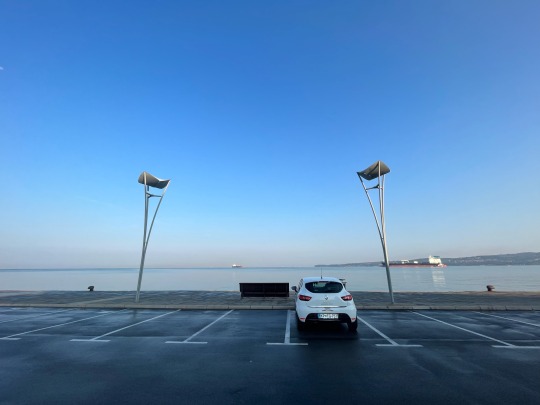
The utopia - K67 kiosk, designed by Saša Mächtig in 1967, concludes its story with the absurdity of the use of the public square next to the sea in favor of parking. As the writer and journalist Martin Reichert, to whom we dedicated this project, would say, “it is a parking lot with the most beautiful view in the world."

K67 is one of the best examples of design during the former Yugoslavia. In the context of the presentation in the public space, with the help of the owner Coastal Galleries Piran, it was placed on the square in Koper in December 2021, in order to become a new generator for its urban content.

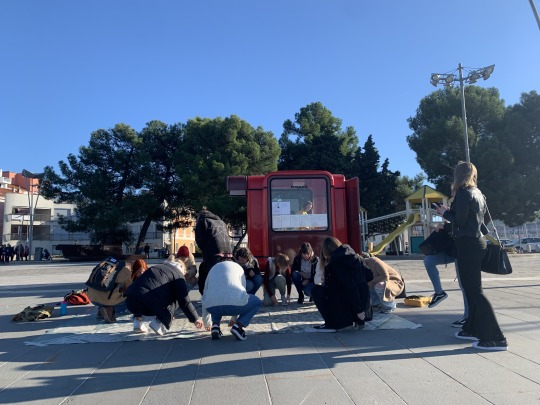
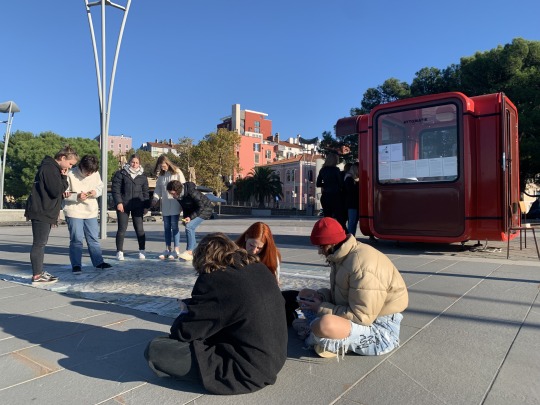
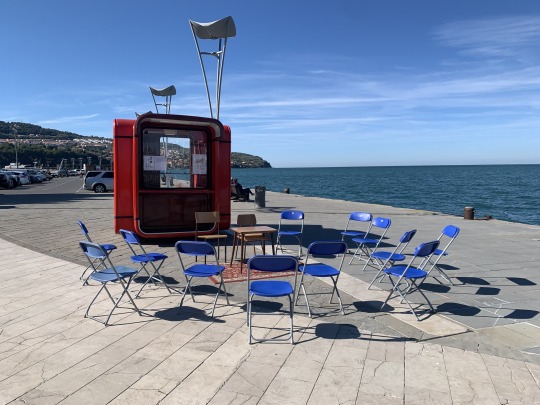



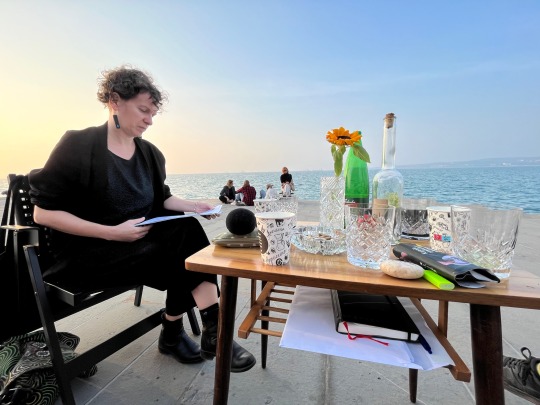
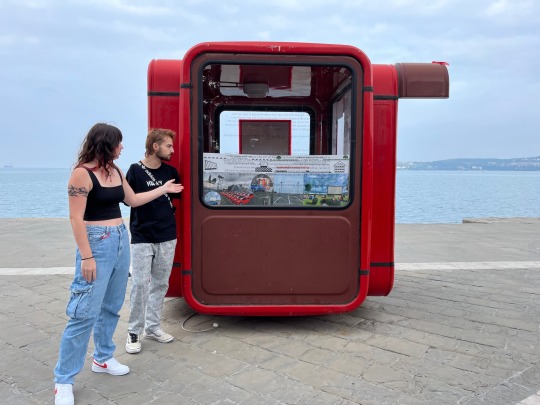

youtube
From spring to late autumn 2023, a process of tactical and performative urbanism took part in the K67 in favour to create an inclusive public space. The main concept proposed and elaborated within the municipality was based on the change of the current parking lot on the square into a green community space.

Unfinished project Solis was more than ten years a failure of a PPP concept. After COVID the investor succeeded to add two more floors of the private apartments.
Tactical urbanism is the opposite of investment urbanism, which has a dispersed structure of activity in space and builds various, mainly residential buildings that sell well, but without a well-thought-out placement in the context of the city. The last plan for Koper was signed by the architect Edo Mihevc in the 1960s.

Urban Plan for Koper, Edo Mihevc (1961). | Source © Neža Čebron Lipovec

The renovation of the new roof for the city market was executed via the municipality but without a public competition.
Today it looks like investor urbanism is much faster than the concept of town planning per se. This results in a fact that there is no more urban planning in the city of Koper today.



The farm market with live animals in plastic tent on Ukmarjev square shows the discrepancy of communication between the municipality and experts.
In Koper as in other towns across the Adriatic coast there is an obvious pressure from investor urbanism. Public spaces are mostly touristized, privatized and don’t belong to dwellers anymore. Therefore is important to ensure that buildings are not built without public competitions. The K67 stays a reminder of a utopia that shall make aware of the importance of reuse and creation of community spaces.

The cruise ships don't need to pay tax in Koper so instead of Venice, were are banned are welcomed for a pollution of cruise tourism.

The utopia K67 is dedicated to the writer and journalist Martin Reichert.
29 notes
·
View notes
Text
Taj Hotels to Make Grand Entrance in Ranchi with New Luxury Property
IHCL Expands Footprint in Eastern India with Strategic Jharkhand Capital Investment Indian Hotels Company Limited (IHCL) is set to bring its iconic Taj brand to Ranchi, marking a significant expansion into Jharkhand’s capital city. RANCHI – IHCL has revealed its elaborate plans to open an opulent Taj hotel in Ranchi, the state capital of Jharkhand, too thereby marking the business’s first foray…
#मुख्य#Featured#IHCL expansion in Jharkhand#IHCL strategic investments#Indian hospitality industry growth#Indian Hotels Company Limited projects#Jharkhand tourism infrastructure#luxury hotels in Eastern India#Puneet Chhatwal on hotel expansion#Ranchi business district development#Ranchi Smart City development#Taj Hotels in Ranchi
0 notes
Text
by Judith Miller
Last fall, Egypt was on the brink of economic collapse. A decade of debt-fueled spending on a pharaonic-scale had emptied its Central Bank coffers. By February, Cairo’s public debt was 89% of its gross domestic product. External debt had soared to 46% of GDP. The pound, its currency, was one of the world’s worst performing. Unable to import supplies and repatriate profits, foreign companies were leaving, or threatening to leave Egypt in droves. Annual inflation was over 35%, and double that for some food staples. Egypt seemed on the verge of a sovereign default—its first ever.
Then came Oct. 7.
Officials, businessmen, and financial analysts say that however horrific the war has been for Israelis and for Palestinians in Gaza, Oct. 7 has helped save Egypt from economic ruin and growing political unrest. To be sure, Egypt is paying heavily for the ongoing Israel-Hamas war on its border. Its three main sources of revenue—hard currency from the Suez Canal, tourism, and remittances from Egyptian workers abroad—have plummeted by between 30% and 40%. But without Hamas’ horrific massacre, which killed 1,200 people and took another 240 hostage, and Israel’s much criticized retaliation in Gaza, Egypt would probably not have gotten the international financial lifeline that has rescued it yet again from economic ruin, just in time.
“Just after the attack, the government began strategizing, successfully it’s turned out, about how to use the crisis to secure a bailout,” said Ahmed Aboudouh, an Egyptian expert at Chatham House, a London-based think tank. “Oct. 7 helped save Egypt’s economy, at least temporarily.”
Last February, the Abu Dhabi Developmental Holding Company (ADQ), Abu Dhabi’s sovereign wealth fund, unveiled plans to develop a city by the sea on part of the 65-square-mile peninsula of Ras el-Hekma, one of the few undeveloped areas on the Mediterranean coast, part of a sale worth $35 billion in investment and debt relief, the largest foreign direct investment deal in Egyptian history. Egypt will retain a 35% stake in the project. Since Sheikh Tahnoun bin Zayed al-Nahyan, the chairman of ADQ, is Emirati President Mohammed bin Zayed al-Nahyan’s brother and the UAE’s national security adviser, the Ras el-Hekma purchase was far more than a financial transaction. It was part of an Egyptian bailout.
Egyptians bristle at the loss of their nation’s diplomatic clout. By reviving its regional profile, Oct. 7 has bestowed another gift on Egypt.
Then in March, Cairo secured a critical $8 billion loan from the International Monetary Fund, with strong American support. The IMF infusion, in turn, opened other foreign faucets. The European Union promptly agreed to provide another $8 billion in grants and loans, ostensibly to help Egypt’s economy, but in reality, to assure Egypt’s help in preventing Arab and African migrants from reaching European shores. In total, the IMF, Europe, and the Gulf have now poured well over $50 billion of foreign currency into Egypt’s cash-strapped coffers. “The U.S., Europe, and the Gulf clearly agreed that the Sissi government could not be permitted to fail,” said Steven Cook, an expert on Egypt at the New York-based Council on Foreign Relations. “Geopolitics has taken over.”
Only months before, the IMF had not completed the review of Egypt’s loan agreement approved in December 2022, thereby withholding a tranche of the $3 billion rescue package, as the government had failed to deliver on agreed benchmarks. While the fund attributed its about-face in March to the increasing damage being done to Egypt’s economy by the Israel-Hamas war—or what it euphemistically called a “more challenging external environment”—absent American pressure on the fund and on Egypt to agree belatedly to financial reforms it had previously rejected, the IMF loan and even the Ras el-Hekma deal would not have gone through. Since Washington is the fund’s largest shareholder with a 16.5% stake, it holds sway over its key lending decisions.
The Biden administration, too, was obviously unwilling to risk the economic collapse and political destabilization of the Arab Middle East’s largest country and the first Arab state to make peace with neighboring Israel in the midst of one of the region’s deadliest wars in modern history and with other conflicts around it still raging—especially since Egyptian mediation with Hamas was crucial to White House policy. “Egypt has proven, yet again,” said Aboudouh, “that it is, as its elite believes, too big to fail.”
7 notes
·
View notes
Text
Maldives president courts investors in China as Indian ties sag - Reuters
At an "Invest Maldives" forum in a southern Chinese port city, Maldivian President Mohamed Muizzu shook hands and exchanged words with smiling local officials on a China visit set to deepen bilateral ties as the archipelagic nation pirouettes [sic?] away from India.[...]
Muizzu became president of the Indian Ocean nation in November after winning on his "India Out" campaign platform under which he called New Delhi's huge influence a threat to sovereignty. His government has since asked dozens of locally based Indian military personnel to leave. And in an apparent snub to India, Muizzu is in China this week, before any visit to his country's giant neighbour. In Fuzhou, the Chinese city designated as the start of China's maritime "Silk Road", Muizzu said China remained one of his country's "closest allies and developmental partners", according to a statement released by his office. Advertisement · Scroll to continue Increasing export of fish products to China under the two countries' free trade agreement will be a key priority, Muizzu added. Fishing is the largest source of employment in the Maldives, where 99% of its territory comprises the sea. Aquatic products account for over 98% of exports by volume and value. Muizzu also said his government was keen to explore partnerships under Xi's Belt and Road Initiative, including the expansion of the country's central airport and commercial port.
Under the Belt and Road Initiative aimed at building a global trade and infrastructure network, China has already helped expand the Velana International Airport in Male and built the cross-sea China-Maldives Friendship Bridge.[...]
Indian Prime Minister Narendra Modi was snorkelling last week in Lakshadweep, an archipelago of atolls and reefs off the coast of Kerala, a visit that some viewed as an attempt to draw tourists away from the nearby Maldivian islands.[...]
Modi's Lakshadweep visit prompted three Maldivian government officials to call him names including "a clown", leading some Indian tourists to share screenshots of cancelled bookings of Maldivian holidays. #ExploreIndianIslands became a trending hashtag in India on X. One of India's largest travel platforms suspended flight bookings to the tourism-dependent Maldives on Monday . "India's strained relations with certain countries in South Asia can be attributed to its perception of being the regional boss," China's Global Times reported on Monday, citing analysts. And, the newspaper added, quoting a Chinese academic, India's current "nervousness" about Muizzu's visit to China showed its "lack of confidence".
Indian Prime Minister Narendra Modi’s promotion of tourism on an Indian island chain has sparked a row with the Maldives after senior officials from that country accused Modi of being a “puppet of Israel”.[...]
Maryam Shiuna, a deputy minister in the Maldives’ government, labelled Modi “a clown” and “puppet of Israel” on X. Another official slammed Modi as a “terrorist”.[...]
After the uproar, the Maldivian government said it had suspended three deputy ministers who made the critical remarks. Their social media posts were deleted and disavowed by the government. But Modi is close to Israel, and on Monday an account on X linked to the Israeli embassy in India appeared to turn the criticism against Modi into a sign of endorsement. “We were in #Lakshadweep last year upon the federal government's request to initiate the desalination program,” the social media post said. “Israel is ready to commence working on this project tomorrow.” Other social media users critical of Modi reacted to the news, seemingly praising the Maldivian officials.
9 Jan 24
11 notes
·
View notes
Text
Let's review the law for Indonesia's major plan to build its local gaming industry (Perpres No. 19/2024)! & my thoughts
For those of you who aren't in the news, the Indonesian government has issued a presidential regulation (peraturan presiden, or perpres for short) earlier this year where they will invest and nurture its local gaming industry. The law, called Presidential Regulation No. 19 2024 on Accelerating the Development of the National Gaming Industry - or Perpres No. 19/2024 for short - was issued on February 12th this year and went into effect that same day, is the Indonesian government's first major attempt to nurture and support its local gaming industry. Among which, the government states that it will fund game projects as minimum as US$40 million, hopes to make 100 prototypes annually, with the achieved goal of having Indonesian-made games taking up 70% of the domestic gaming market, and 10% of the global gaming market.
But you might be wondering, what would the law itself specifically states? Well, I have the copy of the actual law on my hand, so we can take a look at it together! Because idk why I'm bored and I got nothing else better to do.

So, the first thing to note here is that in order to achieve their video gaming industry nirvana, the Indonesian government has set up a team to assist the execution of the law itself. It will be headed by Coordinating Ministry for Maritime & Investment Affairs and conducted in conjunction between the Ministry of Tourism and Creative Economy and of course, our behated bastard child, the Ministry of Communication and Informatics, or known popularly as Kominfo. Yup, the guys who banned Steam and PayPal due to MR5 and blocked all of your porn? That's them.

Funding for this program will be carried out from Indonesian state budget (APBN), local government budgets (APBD), and any other legal funding necessary to help the project. Whether or not game developers will receive the full amount of funding from the Indonesian government as it makes its way from the top to bottom is yet to be seen.
And that is it so far, where the formalities end. The attachment part that comes up next is the most interesting part, as that is where they put a long 14-page essay justifying the need for this regulation, and the steps they're undertaking to achieve the Indonesian government's ideal goal and vision for its local game industry. And it boils down to the largest big talking point mentioned below here:

This passage outlines the goals, in which that the Indonesian-games will get at least 70 whole percents of the local gaming market and 10 percent of the international gaming market. This is a number that is too optimistic in general, especially for the Indonesian government. There's also the aspect of "seeding the values of the Pancasila and national cultural values," which I'll address later on. But without knowing what kind of games the general market domestically and internationally wants, getting that number from scratch is outright unrealistic. Besides, how many games are they going to make to meet that 70%-10% goal?
Which leads us to the next point: they will do this by making 100 video game prototypes annually, promote 100 of them nationally, and promote 30 of them globally.



I feel like this is more of a quantity over quality kind of scenario. Expecting all 100 video games to be prototyped, and then rolled out to public release nationally and internationally under what I assume is a tight bureaucratic government scheme annually, in a country known where red taping is as common as everyday life is going to be very difficult. I wouldn't be surprised if the end goal turns out to be something like 20 games nationally, where 5 of them are promoted internationally. After all, it took A Space for the Unbound seven years from first concept in 2015 to public release, and then another to be nominated at last year's The Game Awards. If the Indonesian government expects to have ASFTU-level kind of game multiplied by 100 to be done within a year, then it needs to heavily readjust its expectations.

But at least there is one thing for sure, the Indonesian Education Ministry (Kemdikbud) will be working together with the Indonesian Games Association (AGI) to develop a national curriculum intended in bringing game dev course studies for vocational school and university students. It's at least nice to see that a standardized video game designing and development will reach a wider academic outreach domestically. Wouldn't be surprised if Indonesian game dev schools start playing Sakurai Masahiro's YouTube videos during class.

Now here comes to the financing and platforming stuff of the law: it states that the Indonesian government will construct an investment scheme through the Indonesia Game Fund through matching funds and venture capitals, in which they are expecting to raise around Rp600 billion or US$40 million annually to fund their game program.
As mentioned earlier, not only these games will be funded through annual state budgets and local government budgets, but third-party ways of funding are also allowed as long as it fits within their legal project. I would assume Indonesian state-owned enterprises would start doing some outreach to big capital investment banks and triple A game companies to fund the project. The extent of how realistic they will reach that 40-million-dollar goal is yet to be seen.

But here's another big, major smoking gun. The Indonesian government is also expecting to formulate a regulation that forces platforms to accept any third-party payments a game would prefer to use. This is a big deal, and it came at a time where Jakarta followed the EU's footsteps and sued Google for monopolistic practices on their payment system in 2022, with preliminary hearings beginning June this year. It was Indonesia's first major attempt to crack down on big tech.
Not only this will have ramifications for the Indonesian video gaming industry, but also the local tech industry at large. Such regulations may potentially cause even Apple to have the Indonesian government knocking on their doors for the same monopolistic behavior over their payment system. Although, I would imagine they would also have to play realpolitik on a case-by-case basis, considering Indonesia has also been wooing Apple for more investments, as well as trying to get them to build a manufacturing plant to make iPhones in the country.
Not to mention, the Indonesian government has been super lenient on local manufacturing schemes for Apple by letting iPhones for sale in the Indonesian market despite the phones themselves aren't manufactured locally, while companies like Samsung, BBK and Xiaomi manufactures are forced to manufacture their phones locally to meet such high standards. And starting an antitrust lawsuit with Apple is a good way to kill off any ambitions Jakarta has to make iPhones within its territory.

Another aspect that got me questioning hard however, is their intellectual property scheme. According to this law, around 25% of the IP rights to the games will be owned by the Indonesian government through a ministry or its state-owned enterprises, or a private company for marketing campaigns. Sure, IP rights and creative transfers like work-for-hire is a very common sight in the game industry, but I can't help but wonder why the Indonesian government would own 25% of your fancy fantasy JRPG game idea specifically, even if it's for marketing? It seems kinda suspicious.
Considering the AGI was involved in formulating the curriculum for game dev studies, and thus, being involved in formulating this regulation as a whole, part of me makes me wonder that 25% is the lowest amount the AGI and the Indonesian government agreed on. Even then, for marketing campaigns alone, giving off a quarter of the IP as a whole to the government seems a bit too much.

The Indonesian government is also planning to formulate a law (undang-undang) to require all foreign video game companies to open a local subsidiary within their borders. Otherwise, the Kominfo will be banning every access to their game services, and even prohibiting sales in Indonesia. I have covered about this issue before in my Nintendo in Southeast Asia history post, and the Indonesian gaming industry, including the AGI themselves have objected strongly against this notion. I assume the AGI couldn't get the Indonesian government to think twice about the ramifications of doing such move, as many local game developers are concerned about possible conflict of interest where big foreign gaming companies would absorb all Indonesian game dev human resources that could've been funneled into local game studios instead.

This also ties in with the future of the Indonesian Game Rating System (IGRS), with a directive to revise the Kominfo Ministerial Regulation No. 11/2016. Which they already did in the form of Kominfo Ministerial Regulation No.2/2024 and is the main reason why the IGRS website is currently down for the time being as they're reformulating how game rating is conducted.

I took a little glimpse over Kominfo's MR2/2024, and most of the articles and clauses remain pretty similar to the previous MR11/2016 regulation, except adding parts regarding game developers and publishers as "electronic system providers" and adding clauses that makes it sound it is mandatory for foreign game companies to open local subsidiaries in Indonesia and have their games properly rated by the IGRS or face repercussions.
And here comes the last interesting part of the law, tighter local domestic content manufacturing (TKDN) schemes on video games. This includes preloading local-made games bundled with gaming system hardwares that are also manufactured locally, under the supervision of the Ministry of Industry, or Kemenperin.


TKDN or local content manufacturing requirements has always been a controversial move conducted by Kemenperin. Despite its intentions to strengthen local tech production, Kemenperin is also known for giving free passes for companies like Apple to sell iPhones, despite not having a manufacturing facility within the country, pretty much undermining their protectionist scheme.
Opening a Foxconn manufacturing plant somewhere in Cikarang to manufacture Nintendo and Sony consoles is unlikely, so it's hard to see how this part of the plan will be executed. Tech companies in general sees Vietnam to be a more promising spot for manufacturing than Indonesia. The Vietnamese government ever since its Doi Moi economic revival program has been giving huge tax breaks, fast-tracked land permits to build factories, and many more to companies who are willing to invest in manufacturing within the country, something Indonesia is lacking heavily. Plus, Vietnam's advantage on sharing its proximity by land to China means the logistics and supply chains for the components needed for manufacturing and assembly would be considerably cheaper and cost-effective compared to shipping it across the South China Sea into Java, not to mention the huge tariffs Indonesian customs will charge on manufacturers.
This is the main reason why Apple chose Vietnam as it seeks to drop its reliance on Chinese manufacturing, while saying "we'll consider it" (which is another way of saying no) on manufacturing in Indonesia during Tim Cook's visit back in April. And since iPhones are made in Foxconn's factory, no Apple factories in Indonesia means no Foxconn factory that is also designed to make Nintendo Switches and PS5s made in Indonesia.
I don't think any companies, including hardware gaming companies, would want to manufacture their consoles in a country where the cost of doing business is way higher and takes longer and more expensive to import stuff for manufacturing.
I do hope that any local content manufacturing mandate they are planning doesn't end up being a huge burden to the customers and end up making video game consoles more expensive, or even outright not being sold due to said local content reasons.
MY THOUGHTS
And that's pretty much it. It is nice to see that the Indonesian government is putting their attention in its local video game industry. Investment and funding into local game studios and letting small indie game developers thrive is always a good thing. But I can't feel but help that the plans and policies taken really feels like Jakarta wants the gaming industry on a more protectionist, us vs. them approach.
The local content manufacturing requirements, the overtly optimistic 70 percent market share goals, the 25% IP transfers for the Indonesian government, the Pancasila and culutral values upholding requirements, everything about it seems like they want game developers to make games what the Indonesian government wants rather than what the consumers and game studios want to make.
The Pancasila and cultural value-upholding requirements in particular seems like a very open-ended excuse to heavily vet Indonesian-made games that doesn't meet the government's narrative, and I am quite concerned that they could have a huge editorial control over what games and concepts developers should make to please the big fat government overlords, such as banning progressive and sensitive topics and ideas in games, LGBTQ+ representation, and anything they deem to be "extremely violent" and "violating the common cultural norms." Which would be very something coming from bureaucrats where the only gaming thing they'd know is playing Zuma on work hours paid by its taxpayers. I hope they can understand and thoroughly examine on what Indonesian gamers, and to an extent, what the global audience want.
But not all of its policies are outright daydreaming or questionable. I welcome their attempts to crack down on big tech by making it mandatory for platforms to accept third-party payment systems, meaning Indonesian gamers could use local payment systems accepting rupiah via QR payment methods, which has been all the rage in the country. It is also nice to see that game dev courses are being planned for vocational school and university students, giving them curriculum-level of attention, it's a humble way to get people interested into game development 101.
Overall, the main points I would like to offer here are:
I wish the Indonesian government lets people make games what they want and what the audience wants, free from total editorial interference and suppression.
Fund game projects realistically and reduce any possible red taping as the funding moves from top to bottom. (Very doubtful, but it would suck to find out that a good game studio got unrightfully dragged into embezzlement/corruption scandals because of what happened on the top during the funding process.)
Make access to dev kits needed to make games easier, with customs and tax fees reduced or dropped entirely.
Setting targets more realistically and put quality over quantity.
Clarify more in-depth about the 25% intellectual property right transfer clause to government institutions.
Protectionist policies like local content manufacturing (TKDN) should not hamper gamers' choices on what gaming platforms and systems, as well as what kind of games they want due to it being inaccessible with higher tariffs imposed on a product. (It would suck if a game console became 50% more expensive due to more Kemenperin/Bea Cukai "economic safeguarding" shenanigans.)
The efforts that Jakarta is giving for its local game developers is very much welcomed. But just like any other political efforts Jakarta is bringing to the table; I think we all should be very cautious on following its development.
4 notes
·
View notes
Text

Reasons behind the fast economic growth of Saudi Arabia:
The rapid economic growth of Saudi Arabia in 2022, especially being the fastest-growing among G20 economies, can be attributed to several key factors:
- Increased Oil Production and Prices: Saudi Arabia, being one of the world's largest oil producers, benefited significantly from rising global oil prices and increased production levels. The rebound in global demand for oil post-pandemic, combined with geopolitical tensions that disrupted other oil supplies, contributed to higher revenues.
- Economic Reforms Under Vision 2030: The Saudi government’s Vision 2030 initiative aims to diversify the economy away from oil dependency. Reforms under this vision have encouraged growth in non-oil sectors such as tourism, entertainment, real estate, and finance, driving economic expansion.
- Investment in Infrastructure: Major infrastructure projects, including NEOM, the Red Sea Project, and the expansion of Riyadh, have attracted significant investments. These projects are not only boosting construction and related industries but are also creating jobs and stimulating the overall economy.
- Foreign Direct Investment (FDI): Saudi Arabia has seen an increase in FDI due to improved business regulations, economic reforms, and strategic partnerships with global companies. The Kingdom's efforts to create a more business-friendly environment have made it an attractive destination for foreign investors.
- Strong Private Sector Growth: Government initiatives to boost the private sector, including supporting small and medium enterprises (SMEs), have contributed to economic growth. Privatization of certain sectors and public-private partnerships have also played a role.
- Expansion of Non-Oil Sectors: Sectors such as tourism, entertainment, and technology have seen rapid growth, fueled by government support and increased consumer spending. Events like the Saudi Seasons, international sporting events, and cultural festivals have attracted visitors and investments.
- Labor Market Reforms: Reforms in the labor market, including Saudization efforts (Nitaqat program) and improved labor laws, have increased workforce participation and productivity, particularly among women and young Saudis.
- Fiscal Prudence and Debt Management: Saudi Arabia has implemented effective fiscal policies, including managing public debt and reducing the budget deficit, which has helped stabilize the economy and promote growth.
- Global Economic Recovery: The global economic recovery post-COVID-19 also played a role, as increased global trade and investment flows positively impacted Saudi Arabia's economy.
These factors combined to create a robust and diversified growth environment, contributing to Saudi Arabia's rapid economic expansion
#KhalidAlbeshri #خالدالبشري
#advertising#artificial intelligence#autos#business#developers & startups#edtech#education#finance#futurism#marketing
10 notes
·
View notes